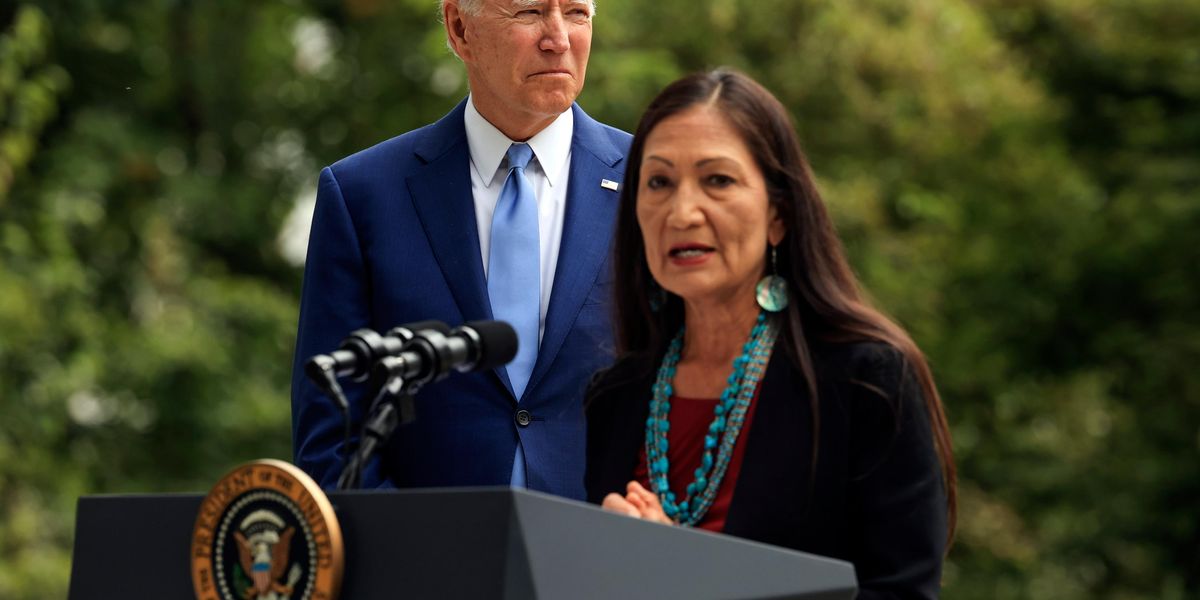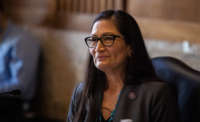
Four major appointments offer a telling roadmap of the Biden administration’s positions on energy and the environment. They range from the very green to the nuclear awful. In Biden’s appointments to top environmental positions, he has done well overall. But in his appointments to top energy posts, he has selected nuclear power devotees.
Deb Haaland Will Make History
Excellent, indeed extraordinary, is the choice of Rep. Deb Haaland to be secretary of the interior. Now facing stiff opposition from Republican senators representing the fossil fuel industry, Haaland would be the first Native American in that position; indeed, she’d be the first Native American to be a member of any cabinet of a U.S. president.
As interior secretary, Haaland would oversee the Bureau of Indian Affairs (BIA), whose long, bitterly contentious relationship with Indigenous communities has often been ugly and hostile. Established in 1824 by then-Vice President John Calhoun, a South Carolina slave-owner, the BIA has banned ceremonial dances and forcibly placed Indigenous children in boarding schools. Overseeing its 8,700 employees, Haaland’s control of the BIA could mark a major revolution in Washington’s relations with Indigenous people, which have been deeply polarized for two centuries.
Hailing from the Laguna Pueblo in New Mexico, Haaland identifies as a 35th-generation New Mexican. She is one of the two first-ever Native American women to be elected to the U.S. Congress. She is known and respected as a solid environmentalist and a strong advocate of safe energy. She participated in the Indigenous encampment fighting to stop the Dakota Access Pipeline, which Biden has yet to kill. Her opposition to oil and gas leasing on public lands and longtime advocacy of renewable energy has drawn ferocious opposition from Western Republicans who clearly do not want her confirmed.
Laguna Pueblo is located next to the largest open-pit uranium mine on Earth which closed in 1982 and caused cancer in her community.
Haaland has also fought the atomic energy industry, championing the Radiation Compensation Exposure Act. Last year, she won the 2020 Nuclear-Free Future Award. She has been an outspoken opponent of the “Consolidated Interim Storage for Spent Fuel and High-Level Waste,” a major industry dump proposed for siting amid the Latinx and Indigenous communities in New Mexico, widely considered to be a blatant case of environmental injustice.
As Julian Brave NoiseCat of the Progressive Change Campaign Committee stated, Haaland’s appointment “is a historic win for Indian Country, the environment, and progressives. The congresswoman is perfect for the job.… That’s why I worked with tribal leaders, progressive activists, environmentalists, feminists and so many others to urge Biden to do the right thing and make history.”
“Like many of our people,” said NoiseCat, “[Haaland] lived on food stamps. She raised her daughter as a single mother. She started a salsa business on her reservation and cooks for family and friends on traditional Pueblo feast days. Like so many across the country, she’s still paying off student loans. Unlike so many in the halls of power, she’s one of us. Sometimes, Native folks lovingly call her ‘Auntie Deb’ on social media for exactly this reason.”
The League of Conservation Voters gives Haaland a score of 98 percent on environmental issues. Corporate Republicans, largely owned and operated by oil and gas interests, are demanding Biden withdraw his nomination of Haaland.
Ironically, she is receiving strong support from Alaska’s Republican Congressman Don Young, long an environmental nemesis, who has worked well with Haaland in the House. He’s acknowledging to fellow Republicans that they have disagreements but told them last week, “You’ll find out that she will listen to you.”
Michael Regan Will Inherit a Gutted EPA
Another hopeful appointment is Biden’s choice of North Carolina’s Michael Regan to head the Environmental Protection Agency (EPA).
Regan served in the EPA’s air quality and energy programs during the Clinton and George W. Bush administrations. Back in North Carolina, he formed his own consulting firm, then became administrator of the state’s Department of Environmental Quality, appointed by Democratic Gov. Roy Cooper.
In North Carolina, Regan took over a government agency in utter, calculated chaos, demanding serious rebuilding. After four years of Trump, the agency Regan will inherit in Washington is also in shambles.
Regan garnered praise in North Carolina for winning the nation’s largest coal-ash clean-up settlement from Duke Power. He also got Chemours, a massive chemical company, to clean up toxic pollution from the Cape Fear River.
He became a key figure in overseeing North Carolina’s Climate Change Interagency Council and its work to achieve carbon neutrality in the state by 2050. And in 2018, Regan set up the North Carolina Department of Environmental Quality’s first Environmental Justice and Equity Board.
Regan would be the first Black man to become an EPA administrator.
“He will be great,” said former Charlotte, North Carolina, Mayor Jennifer Roberts in an interview. “He’s an excellent choice.”
But Regan drew strong fire from environmentalists with his approval of a water quality certification of the proposed Atlantic Coast Pipeline. The pipeline would have carried methane gas across the much-loved Appalachian Trail. Duke Energy and Dominion Energy later canceled the project due to green opposition.
And Regan has also drawn strong criticism for a perceived unwillingness to stand up to North Carolina’s powerful agricultural lobby, especially on the issue of factory farming. How hard Regan would fight against such interests at the national EPA remains to be seen.
Additionally, during his tenure in North Carolina, there was opposition to wood pellet biomass facilities that were permitted to expand production, causing climate, forest and human health impacts disproportionately affecting communities of color, as has been reported on Truthout.
Energy Secretary Nominee Is a Nuclear Power Advocate
Biden’s appointment of former Michigan Gov. Jennifer Granholm as secretary of energy represents a win for the never-ending promotion of nuclear power. She has strongly opposed fossil fuels in favor of renewable energy, but she is a nuclear power advocate.
Granholm was governor of Michigan when the Obama administration bailed out automobile manufacturers during the 2008 recession. She became a champion of electric vehicle technology to preserve her state’s vehicle industrial base.
Granholm “has spoken really clearly about moving away from fossil fuels,” said Jamie Henn, a co-founder of 350.org. The group has been a leader in the fight against climate change, largely caused by the burning of fossil fuels — including in vehicles.
But on nuclear power, Granholm’s record is poor, according to Kevin Kamps, who is a radioactive waste specialist with the national anti-nuclear group Beyond Nuclear, and was for three decades a member of the board of directors of the organization Don’t Waste Michigan. He said that in 1999 and 2000, when Granholm was Michigan’s attorney general, “a coalition led by Don’t Waste Michigan approached her AG office for help in our resistance to the weapons-grade MOX — plutonium-uranium Mixed Oxide nuclear fuel.” But, “Unfortunately, Granholm and her staff turned us down. She would not aid our resistance in any way.”
Kamps explained in an interview that Granholm’s “refusal to help resist MOX in 1999-2000 foreshadowed her eight years as governor, from 2003 to 2011. Even though we fought many very significant — safety, health, security and environmental protection — battles that entire time, Granholm’s administration very rarely, to never, helped us.”
Granholm worked closely with Michigan nuclear utilities like CMS/Consumers Energy, said Kamps, noting, “A former CMS executive served as a campaign leader in one of Granholm’s runs for governor.”
Still, “despite her lackluster record on nuclear power and radioactive waste issues, I do thank and praise Granholm for her administration’s environmentally protective offshore wind power development plans in Michigan,” Kamps said.
In her statement to the U.S. Senate Committee on Energy and Natural Resources as it considered whether to confirm her appointment by Biden, Granholm declared, “If confirmed as Secretary, I will support the whole-of-government approach and work … with Congress to empower the U.S. nuclear industry to develop, demonstrate, and export American-made nuclear technology.”
Meanwhile, Maria Korsnik, president and CEO of the Nuclear Energy Institute, the leading U.S. group promoting nuclear power, said in a statement issued upon Granholm’s nomination by Biden: “We welcome the nomination of Governor Jennifer Granholm as the incoming Secretary of Energy…. Under Gov. Granholm’s leadership, we hope to see continued bipartisan support for nuclear energy in playing a pivotal role in addressing the worsening climate crisis as recognized in the Biden team’s ambitious climate plan.”
Of course, Korsnik’s statement avoids acknowledging that nuclear power is a contributor to climate change; that the “nuclear fuel cycle” — especially mining, milling and fuel enrichment — is carbon-intensive; and that nuclear power plants themselves emit Carbon-14, a radioactive form of carbon.
Most regrettably, Granholm’s stance on nuclear energy might fit in well with the long avidly pro-nuclear U.S. Department of Energy.
This leads us to the worst news among Biden’s environmental and energy appointments: his selection of nuclear power zealot Christopher T. Hanson as chairman of the Nuclear Regulatory Commission (NRC).
A Nuclear Power Zealot as Chair of the NRC
Before becoming one of the NRC’s five appointed commissioners, Hanson served in the U.S. Department of Energy’s Office of Nuclear Energy — an entity which is a direct throwback to the U.S. Atomic Energy Commission (AEC) and its mission to promote nuclear power.
The AEC was abolished by Congress in 1974 because of its inherent conflict of interest for its dual roles of both promoting and at the same time regulating nuclear power. In the place of the AEC, the NRC was formed to regulate atomic energy and, later, the Department of Energy (DOE) was created to promote nuclear power, with the Office of Nuclear Energy within the DOE being the lead component pushing atomic energy at the agency.
Meanwhile, the NRC has also continued to promote nuclear power.
In 2012, in the wake of the Fukushima nuclear disaster, then-NRC Chairman Gregory Jaczko, a Ph.D. physicist, insisted that in all NRC decisions there be an integration of “lessons learned” from that catastrophe in Japan. The nuclear industry applied pressure and Jaczko was forced out as NRC chairman.
The nuclear industry will have no such problem with Hanson, an ardent, outspoken member of the nuclear power cult. As he said upon his appointment by Biden, “I look forward … as the commission … faces new opportunities as nuclear energy technologies continue to evolve and use of nuclear materials expand in the future.”
The American Nuclear Society (ANS) said of Hanson’s appointment, “On behalf of America’s nuclear professionals, we applaud President Biden for designating ANS member Christopher T. Hanson as chair of the U.S. Nuclear Regulatory Commission.”
As an NRC Commissioner, Hanson voted against every one of more than 100 legal and technical objections raised by environmentalists to “Consolidated Interim Storage Facilities” for nuclear waste, despite their violating the Nuclear Waste Policy Act of 1982, according to Kamps.
Thus, the NRC’s long, sorry history as a rubber stamp for the industry may be getting yet another nuclear pusher at its head. This comes at a time when the 94 nuclear power plants in the U.S. have already reached an average age of 40 years old, which was initially established in the U.S. as the age threshold past which they would be deemed unsafe due to embrittlement of metal components by radioactivity and other issues. Many are exhibiting serious, disturbing signs of embrittlement and general deterioration. Only the NRC has legal authority to inspect these increasingly dangerous reactors and enforce the safety standards that might prevent another Three Mile Island, Chernobyl or Fukushima disaster. Unfortunately, Biden’s choice to head the commission does not appear to be someone who will do what needs to be done to protect the public, as opposed to the industry.
Trump was horrible on environmental and energy issues — rolling back decades of environmental regulations, ordering a government-wide denial that the climate crisis was happening, seeking to position the U.S. as a leader in pushing nuclear power globally.
Action at the grassroots is needed to get the Biden administration to provide more than a mixed bag of improvements, to get to the needed big change.
This post was originally published on Latest – Truthout.






 :
:



 ACTION ALERT
ACTION ALERT 

 (@sunrisemvmt)
(@sunrisemvmt) 

